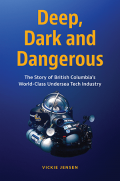 Many years ago, I interviewed for the job of editor with a new trade journal about coastal workboats. I wanted the Westcoast Mariner job desperately, but felt certain I didn’t know enough. Nervously I confided to Alan Haig-Brown during the interview, “Alan, I don’t know a tugboat from a football.”
Many years ago, I interviewed for the job of editor with a new trade journal about coastal workboats. I wanted the Westcoast Mariner job desperately, but felt certain I didn’t know enough. Nervously I confided to Alan Haig-Brown during the interview, “Alan, I don’t know a tugboat from a football.”
“Don’t worry,” he reassured me. “You know how to write, how to keep a budget and how to stick to a deadline. You can learn the rest.”
And learn I did.
Most of that learning came as on-the-job training. I was pretty sure that I was the only female editor who kept a pair of gum boots in her bottom desk drawer. A big part of the job was going out on a different coastal workboat—tugs of all sorts, dredges, Coast Guard craft, ferries, charter boats and water taxis, every month. For those feature stories, I wrote about the vessel I was on, but I especially enjoyed talking with crew members. I wanted to find out what the job was like, what was tough about the work, and what kept them coming back to the water.
Long before Google and the internet, I also discovered the importance of building a network of people to call on for advice, folks who were willing to share their perspective and knowledge of maritime history. And by regularly going out on various workboats and interviewing their crews, I slowly gained my own experience about the vessels and the people working our provincial waters.
My husband, Jay Powell, a UBC anthropologist, also gave me a useful understanding that he would introduce early in his Anthropology 101 classes. He explained to those students that culture isn’t just the lifeways of “primitive” groups or other countries. Even within our own familiar Canadian or North American framework, there are many subgroups, like sports teams or occupations, that have their own culture, their own ways of how things are done. Often those unwritten “rules” can be different for men and women or for different ranks in any job. So, in my interviews, I learned to pay attention to the distinct ways and wisdom of a subgroup like crews on coastal workboats. My challenge was to learn about their work by listening to their stories, experiences and explanations and to share those with readers.
When I eventually switched from monthly magazine deadlines to writing non- fiction books, I continued learning about and celebrating the work that people do on the Northwest Coast. So, for my first book, I spent three months with a totem pole carving crew, documenting in words and photos the process of carving a totem pole. Although Jay and I had been working with First Nation peoples for many years, the business of totem pole carving was all new information. I quickly learned to open my eyes more and my mouth less. The result was hours of taped interviews and thousands of photographs. I’m honoured to say that the book was nominated for the Roderick Haig-Brown Regional Prize in the B.C. Book Prizes. And this year Totem Pole Carving has again been reprinted by the University of Washington Press.
However, I missed the maritime world and remembered being fascinated by the few women I’d interviewed over my four years of editing Westcoast Mariner. My book publisher was interested in my idea, but didn’t want just “seven women, seven chapters.” The problem was, I only knew of five women, so I called my maritime contacts and asked for recommendations. The suggestions poured in. And in the end, I had to cap off interviews after talking with 110 women!
The result was my second book Saltwater Women at Work. What I remember most about that wonderful book launch was one young woman who confided, “Giving my mother this book is like giving her the graduation diploma I never got.”
These gutsy women, along with the hundreds of mariners I’d interviewed for Westcoast Mariner magazine and the five guys on the totem pole carving crew, all taught me about the culture of their work. They shared their world — their jobs and skills, their accomplishments and failures, their frustrations and their hopes. My job was to convey their stories accurately and fairly.
Over the past three years, I’ve become immersed in a new workplace culture— one that’s happening beneath the water. I’ve interviewed inventors, subsea pioneers, business owners and workers who know the depths of coastal and global waters and who established B.C. as a world leader in subsea technology. Deep, Dark & Dangerous will be my 14th book, and I’m honoured that those I spoke with trusted me with their stories and taught me about their world of underwater work. This is an unknown chunk of provincial history that deserves to be celebrated! I’m grateful that Harbour Publishing agreed and will publish this new book in the fall of 2021.
